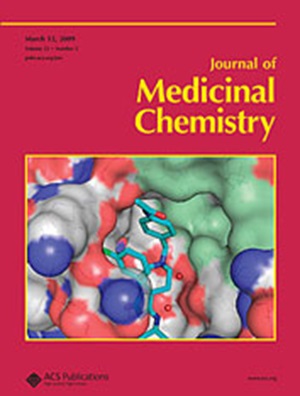Machine Learning-Assisted Iterative Screening for Efficient Detection of Drug Discovery Starting Points.
IF 6.8
1区 医学
Q1 CHEMISTRY, MEDICINAL
引用次数: 0
Abstract
High-throughput screening (HTS) remains central to small molecule lead discovery, but increasing assay complexity challenges the screening of large compound libraries. While retrospective studies have assessed active-learning-guided screening, extensive prospective validations are rare. Here, we report the first prospective evaluation of machine learning (ML)-assisted iterative HTS in a large-scale drug discovery project. Using a mass spectrometry-based assay for salt-inducible kinase 2, we screened just 5.9% of a two million-compound library in three batches and recovered 43.3% of all primary actives identified in a parallel full HTS─including all but one compound series selected by medicinal chemists. This demonstrates that ML-guided iterative screening can significantly reduce the experimental cost while maintaining hit discovery quality. Retrospective benchmarks further showed that the ML approach outperforms similarity-based methods in hit recovery and chemical space coverage. In summary, this study highlights the potential of ML-driven iterative HTS to improve efficiency also in large-scale drug discovery projects.机器学习辅助迭代筛选有效检测药物发现起点。
高通量筛选(HTS)仍然是小分子先导物发现的核心,但日益增加的分析复杂性对大型化合物文库的筛选提出了挑战。虽然回顾性研究已经评估了主动学习引导筛查,但广泛的前瞻性验证很少。在这里,我们报告了机器学习(ML)辅助迭代HTS在大规模药物发现项目中的首次前瞻性评估。使用盐诱导激酶2的质谱分析,我们在三个批次中筛选了200万个化合物文库中的5.9%,并回收了在平行完整HTS中鉴定的所有主要活性的43.3%,包括药物化学家选择的所有化合物系列,只有一个除外。这表明,机器学习引导的迭代筛选可以显著降低实验成本,同时保持命中发现的质量。回顾性基准进一步表明,机器学习方法在命中恢复和化学空间覆盖方面优于基于相似性的方法。总之,本研究强调了机器学习驱动的迭代HTS在提高大规模药物发现项目效率方面的潜力。
本文章由计算机程序翻译,如有差异,请以英文原文为准。
求助全文
约1分钟内获得全文
求助全文
来源期刊

Journal of Medicinal Chemistry
医学-医药化学
CiteScore
4.00
自引率
11.00%
发文量
804
审稿时长
1.9 months
期刊介绍:
The Journal of Medicinal Chemistry is a prestigious biweekly peer-reviewed publication that focuses on the multifaceted field of medicinal chemistry. Since its inception in 1959 as the Journal of Medicinal and Pharmaceutical Chemistry, it has evolved to become a cornerstone in the dissemination of research findings related to the design, synthesis, and development of therapeutic agents.
The Journal of Medicinal Chemistry is recognized for its significant impact in the scientific community, as evidenced by its 2022 impact factor of 7.3. This metric reflects the journal's influence and the importance of its content in shaping the future of drug discovery and development. The journal serves as a vital resource for chemists, pharmacologists, and other researchers interested in the molecular mechanisms of drug action and the optimization of therapeutic compounds.
 求助内容:
求助内容: 应助结果提醒方式:
应助结果提醒方式:


